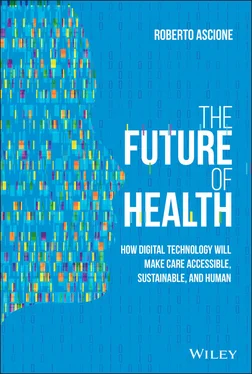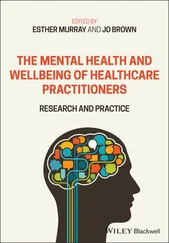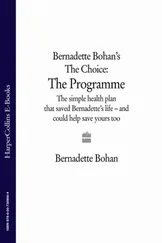Remote treatment of a patient is less expensive and generally more efficient than on-site assistance. For this reason, solutions such as Sensely also offer a clear cost advantage to providers and insurers. A recent study has shown that Sensely reduced patient calls to health-care professionals by 28 percent, and freed nearly one-fifth of the day for those health-care professionals involved in the study. But above all, the Sensely nurse offers the promise of improved results, more frequent health monitoring and greater involvement of patients in their own care. It's something to think about the next time you're waiting in your doctor's waiting room.
The company recently closed a round of investments worth $15 million, finalized at increasing the number of languages available on the platform, to further expand into North America, Europe, the Middle East, Asia, and Australia.
A Dutch company has developed the SkinVision app, which is able, thanks to a photograph taken with a person's smartphone and through special algorithms, to detect some forms of skin cancer. Initially the application was focused on the detection of melanoma, but subsequent improvements and refinements of the recognition algorithm now allow the app to identify other types of cancer such as basal cell carcinoma (BCC) and squamous cell carcinoma (SCC). There are many people in the world at risk of developing skin cancer (more than one billion every year) and SkinVision can be a useful diagnostic tool, mainly thanks to the speed with which it returns results. SkinVision helps many people assess and monitor the health of their skin in all areas of the body by helping them recognize early risk indicators. This allows them to gain valuable time on diagnosis and possible treatment. The SkinVision app makes it possible for a person to create a seamless connection with his or her dermatologist to continuously monitor skin lesions, thus building a personal archive that can be referred to during visits, facilitating the work of the dermatologist and improving the quality of care.
Melanoma is a type of skin cancer that forms in the cells responsible for skin pigmentation, known as melanocytes. Although it is less common than other forms of skin cancer, it is unfortunately among the most aggressive types. There are about 132,000 cases of melanoma diagnosed each year worldwide. There are also 3 million cases of other types of skin tumors diagnosed globally. Early diagnosis allows people with melanoma to get the care they need quickly. SkinVision is able to provide concrete help for assessing the danger of an irregular spot, mole, strange pigmentation, or birthmark with an accuracy in diagnosis reaching up to 95 percent. The company has built a portfolio of 1.2 million users worldwide and a database of 3.5 million images of skin areas, both suspect and benign.
The mission of the Amsterdam-based company is to empower everyone to make the early diagnosis of skin cancer more efficient, something that is extremely important for determining treatment options. The goal of Erik de Heus, founder and CEO of SkinVision, is to save 250,000 lives over the next decade.
Guest Perspectives
JEFF DACHIS
CEO, One Drop
Jeff Dachis is one of the most well-known figures in the American tech scene. In 1994, he founded one of the first digital transformation firms, Razorfish.
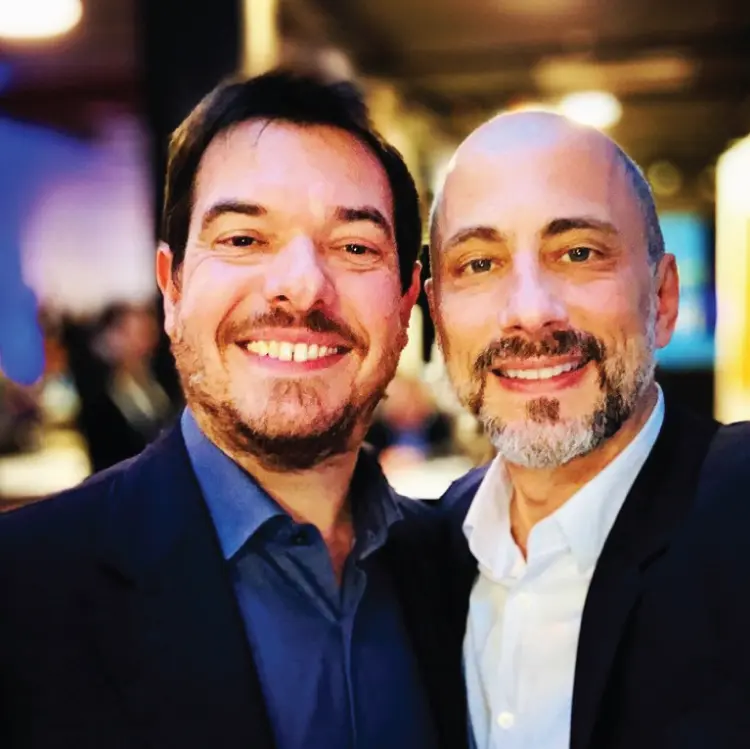
Jeff Dachis and Roberto Ascione
Credit: Roberto Ascione (Author)
In 2008, Jeff Dachis founded Dachis Group, a company that uses proprietary data analytics technology to help brands optimize their social marketing performance. In 2014, the group was acquired by Sprinklr. But the real turning point in his life came in 2013, when he turned 47 and was diagnosed with type 1 diabetes. “I remember going to the doctor and talking to the nurse for a few minutes. Then they gave me an insulin pen, a prescription, and a pat on the shoulder. I really felt neglected.” Since then, he has given himself a mission: to use new technologies for improving the lives of every person with diabetes. The result was One Drop, an app whose goal is to help people with diabetes record, learn, and share information so that they can better manage the disease. But Dachis' vision goes further: “Increasingly inexpensive pervasive sensors, increasingly powerful smartphones, and giant cloud-computing environments will transform health care as we now know it. Not only will interactions between patients and health care professionals be drastically altered, but thanks to the real-time access to the patients' biometric data, the work of health-care professionals and paramedics will also be better and more efficient. Thanks to the unprecedented possibility of having real-time access to the telemetry of their biometric data, the entire procedure of delivering health care will undergo an overwhelming transformation. This huge ‘evolutionary leap’ will transform the role of the health care professional into something very different from how we understand it today, with a good part of the work that will be carried out by the computing power of cloud computing. This will be possible both for the volume and for the quality of the data available, combined with the ability of giving the data an intelligible meaning through the algorithms of artificial intelligence. This data can be compared with those of the medical literature, as well as with all the knowledge concerning it (especially when it will be possible to consult those anonymized cases of the various digital health records, allowing diagnosis on a global scale). Health-care techniques will be improved, the cost of care will fall dramatically, the health-care professionals and paramedics will be employed in a better and more efficient way. And all this will happen thanks to better processing of the data.”
MONIQUE LEVY
Chief Commercial and Strategy Officer, WOEBOT
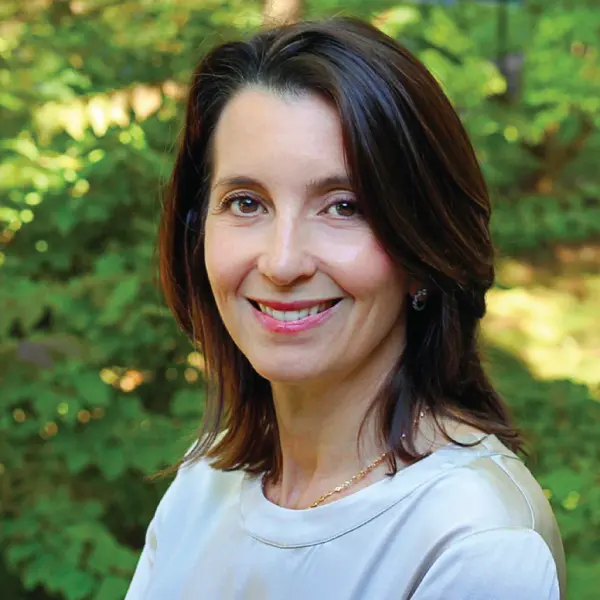
Monique Levy
Credit: Monique Levy – Private archive
Relational agents represent the most profound shift in digital health to date, and the most exciting application of AI, conversational UX, and other technologies combined.
Relational agents are software designed to build and maintain a social-emotional bond with users over time, and to enhance or help the user in some way, such as shifting cognition and affect to new behaviors, decisions, and knowledge. The concept of a relational agent was first discussed more than 20 years ago, most notably at MIT Media Lab's Affective Computing Group, which developed and evaluated an exercise advisor system to explore interactions between people and relational agents. The lab's study 1 found user ratings along the lines of respect, trust, and likeability were higher for the relational agent than those for the non-relational agent. A decade later another study 2 demonstrated that “individuals were more willing to disclose to an artificially intelligent ‘virtual therapist’ than when they believed it was human-operated.”
Today's relational agents are capable of so much, but one of their more exciting applications is in the area of mental health, and one of the most innovative companies in the space is Woebot Health, where I am the chief commercial and strategy officer.
Woebot Health is the company pioneering industrializing relational agents for various unmet needs in mental health, and the first to apply them to CBT-based therapy. Its relational agent, Woebot, is accessible via apps that use a conversational UX. Woebot is built from core principles of human relationships and therapeutic process and enables people to more deeply engage with their mental health in the moment, and stay engaged as new episodes emerge over a lifetime. Woebot is also capable of quickly building a bond with users. Bond , or therapeutic alliance in clinical terms, reflects the rapport that develops between participants and Woebot. In psychotherapy, close rapport between therapist and client is a predictor of the level of change achieved. Woebot has recently demonstrated an ability to show human-level bond in a large-scale study using a standard validated measure of therapeutic relationship. Results show that Woebot can quickly create a bond non-inferior to human therapists, and maintains that bond over time, which can lead to improved mood, deeper engagement in treatment, and improved outcomes.
Читать дальше
